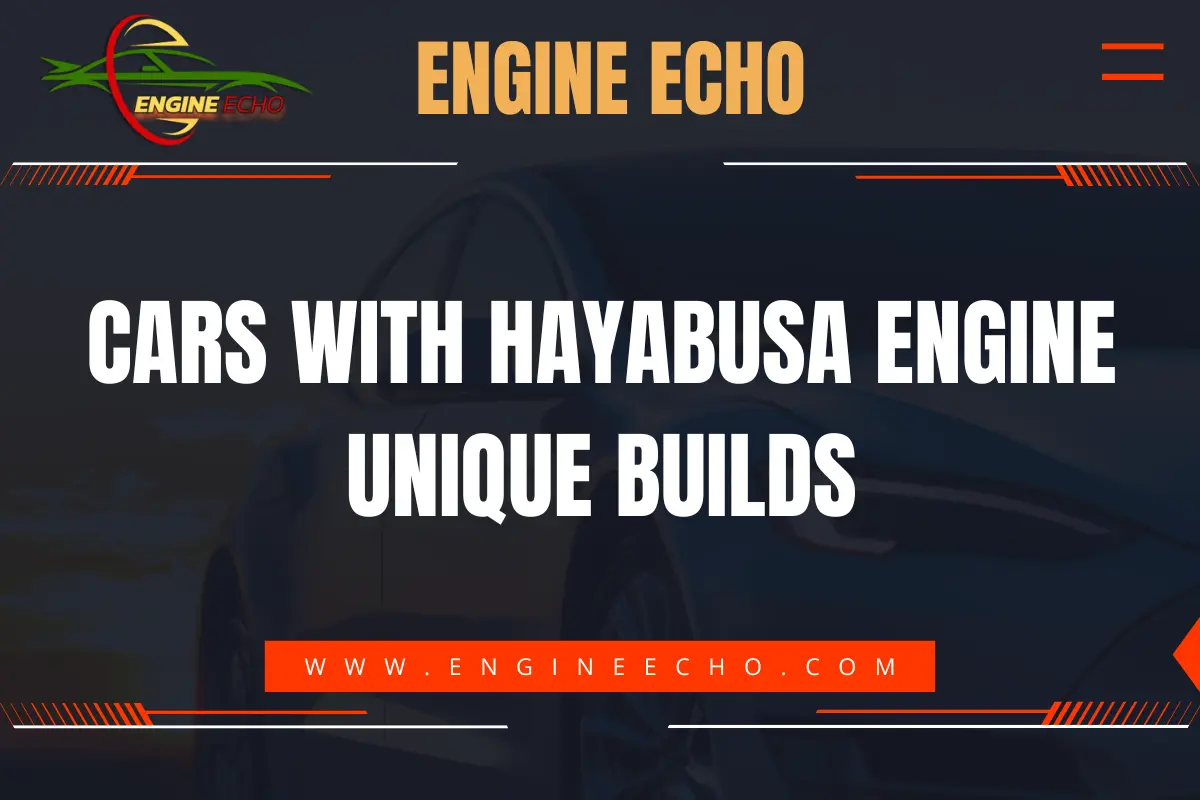Cars with Hayabusa Engine: Unique Builds

Key Takeaways
- Compact Power: The Suzuki Hayabusa engine, known for its compact size and immense power, revolutionizes lightweight vehicle builds.
- DIY Potential: A popular choice among car enthusiasts for its affordability, availability, and ease of adaptation.
- Customization Challenges: Engine swaps require advanced cooling systems, custom mounts, and transmission modifications.
- Safety and Compliance: Ensuring safety through structural reinforcements and adherence to legal regulations is crucial.
- Future Trends: Hayabusa swaps continue to inspire innovation, from professional builds to eco-conscious modifications.
Introduction
The Suzuki Hayabusa engine, originally crafted for one of the fastest motorcycles ever built, has become a sensation in the custom car world. Combining lightweight construction with robust performance, this engine has found a new life in compact cars, kit vehicles, and even off-road machines. Its compact size and power-to-weight ratio make it a favorite for enthusiasts looking to push boundaries in speed, agility, and innovation.
The Power of the Hayabusa Engine
History and Specs
- Introduced in 1999, the Suzuki Hayabusa engine features a 1,299 cc inline-four configuration.
- Produces over 170 horsepower with a lightweight design, ideal for high-performance applications.
- A versatile engine due to its affordability, availability, and support from a vibrant community of DIY enthusiasts.
Why It’s Popular for Car Builds
- High power-to-weight ratio ensures minimal impact on car balance.
- Compact dimensions make it suitable for space-limited engine bays.
- Performance comparable to more expensive custom engine solutions.
Iconic Cars with Hayabusa Engine Swaps
Caterham Seven
With the Hayabusa engine, the Caterham Seven transforms into an ultra-light, high-speed machine. The powerful engine enhances acceleration and delivers an exhilarating driving experience.
Suzuki Cappuccino
This pint-sized car becomes a powerhouse with the Hayabusa engine. The enhanced power-to-weight ratio creates a vehicle that feels as agile as a go-kart but much faster.
Westfield Megabusa
A kit car specifically designed for Hayabusa engines, it showcases the engine’s potential for speed and lightweight agility.
Hayabusa Engines in Off-Road Vehicles
Buggies and Sand Rails
The Hayabusa engine adds incredible power and torque to off-road buggies, enabling them to handle rugged terrain with ease. Custom cooling solutions and reinforced frames are common upgrades.
ATVs and UTVs
Adapting the Hayabusa engine for ATVs requires expertise, but the result is a versatile, high-performance off-road vehicle capable of tackling extreme conditions.
Custom-Built Cars with Hayabusa Engines
Grassroots Motorsports Builds
Enthusiasts frequently use Hayabusa engines in grassroots projects, including classic Minis and kit cars. These projects highlight the creativity and engineering expertise within the DIY community.
Drag Racing
For drag racing, the Hayabusa engine’s high RPM and rapid acceleration make it an ideal choice, especially in lightweight vehicles designed to dominate the strip.
The Engineering Challenges of Hayabusa Swaps
Mounting and Adaptation
- Custom mounts are essential for fitting the engine securely into a car chassis.
- Adapters for transmissions ensure smooth power delivery and gear changes.
Cooling System Modifications
- Motorcycle engines rely on airflow, so installing custom radiators and fan setups is critical to prevent overheating.
Exhaust and Drivetrain Adjustments
- Custom exhaust systems are necessary to handle increased heat and flow.
- The drivetrain must be reinforced to handle the high RPM output.
Performance Benefits of a Hayabusa Engine
Power-to-Weight Ratio
- Enhances the responsiveness of any vehicle, particularly lightweight builds.
Acceleration and Speed
- Vehicles powered by Hayabusa engines deliver thrilling acceleration and top-end speeds.
Improved Handling
- Lightweight design preserves the car’s agility and balance, making it ideal for tight corners and dynamic driving.
Safety and Legal Considerations
Structural Reinforcements
- Reinforcing the chassis, adding roll cages, and upgrading brakes are essential for safety at high speeds.
Legal Compliance
- Check emissions, noise levels, and registration requirements to ensure the vehicle is roadworthy.
Insurance Challenges
- Inform insurers of modifications and seek specialized providers to cover unique builds.
Case Studies of Hayabusa-Powered Cars
Lightweight Sports Car (Car X)
- Features: Custom cooling system, enhanced drivetrain.
- Performance: Achieved a 0-60 mph time under 4 seconds.
Drag Racer (Car Y)
- Highlights: Aerodynamic improvements paired with a turbocharged Hayabusa engine.
- Result: Broke local drag strip records with ease.
Future Trends in Hayabusa Engine Swaps
- Increased use of hybrid adaptations, combining Hayabusa engines with electric motors for added torque and eco-friendliness.
- Advancements in lightweight materials make swaps easier and more efficient.
- Rising popularity in emerging markets where cost-effective performance is in demand.
Conclusion
The Suzuki Hayabusa engine stands as a beacon of innovation for custom car builds. Its compact size, affordability, and sheer power make it a versatile option for enthusiasts looking to create unique, high-performance vehicles. From grassroots projects to professional builds, the Hayabusa engine proves its worth time and time again.
Frequently Asked Questions (FAQs)
Q1: What makes the Hayabusa engine ideal for car swaps?
Its high power-to-weight ratio, compact size, and affordability make it perfect for a variety of vehicle types.
Q2: Are Hayabusa engine swaps legal?
Yes, but ensuring compliance with local emissions, noise, and safety regulations is essential.
Q3: How does the Hayabusa engine compare to other motorcycle engines?
It offers more power and better aftermarket support, making it a top choice for performance builds.
Q4: What challenges are involved in a Hayabusa swap?
Common challenges include cooling system modifications, mounting adjustments, and drivetrain compatibility.
Q5: Can a Hayabusa-powered vehicle be used off-road?
Absolutely. With the right modifications, the engine adapts well to off-road applications like buggies and ATVs.
Thanks for checking out this article on EngineEcho.com! Hope you found this article: "Cars with Hayabusa Engine: Unique Builds" helpful! If you liked it and want to dive into more car engine topics, head over to our homepage. There's always something new to discover in the world of engines. Enjoy your reading journey!
Check out our previous article: Cars with EcoBoost Engine: Performance and Efficiency






